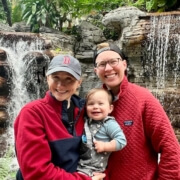Follow The North Star: Navigating The Changing Realities of an Alzheimer’s or Dementia Diagnosis
Dementia and Alzheimer’s are often used interchangeably. Dementia is the umbrella term for all progressive conditions with cognitive decline. Alzheimer’s, the most common form of dementia, is a progressive disease beginning with mild memory loss and possibly leading to loss of the ability to carry on a conversation and respond to the environment.
Over the years, one of the statements I have frequently heard from people living with dementia and their families is, ‘We are OK with what we have now, as long as it does not change and get any worse.’ There are two interesting facts about this:
- People say it about every stage, from prediagnosis to end-of-life support.
- It always gets ‘worse’ if this means the cognitive deterioration continues.
Understanding some of the key questions about supporting a person with dementia has become more crucial. According to the Alzheimer Society, there are currently 6.7 million Americans living with dementia, and one in three people over 80 will die with some type of dementia. However, the impact of the condition is much broader. For each person living with dementia, there are two to three people who report that supporting that person has a direct impact on their daily lives, including financially, as the dementia community in the U.S. ranges between 20-25 million.
When supporting a person with dementia, the north star to offer is a reality check and personal reflection. Let us look at three phases of reality that people often struggle to navigate.
‘Why Get Diagnosed If There Is No Cure?’
This question is often voiced. However, seven out of 10 Americans would like to receive a diagnosis early to provide for treatment and planning. There is a worry that people will receive a diagnosis that will upset them and it is important to remember that this emotion is a valid response. Dementia is a chronic degenerative condition, and many fear it. However, being upset is not the only emotional response that can be evoked. Many people report that receiving a diagnosis of dementia comes as a relief to them, making claims like– “I knew there was something wrong,”or “at least I know I am not going mad”.
With the right information and support, a dementia diagnosis can act as a wake-up call to prioritize what is most important in life. It makes people realize that time is precious and helps with planning on many levels. For some, it is going on that milestone 80th birthday vacation a couple of years earlier to ensure they can truly enjoy it. A diagnosis often motivates people to make decisions that will impact the future of their loved ones, such as financial and estate planning, so that they can be actively involved in the process. This focus on planning can create a sense of control and pave a clearer path for all involved in their journey.
‘Just The Two Of Us, Against The World’
People can live for many years with dementia. Partners in long-term, close relationships often establish codependent habits and routines–one cooks, one clears, one washes and one folds. Additionally, couples are accustomed to doing things together, such as the weekly bingo night, food shopping or weekend walks with the dog.
When we talk to partners about supporting a loved one with dementia, the transition is a common theme in every culture. The shifts can be subtle, but the plural language of a couple as a unit changes in every story. It starts with ‘We enjoy doing X’ or ‘We always go to our favorite place on Saturday nights.’ As time passes, the language changes to ‘Now I do X, and they do Y’. It is no longer a plural language. This is important to note, especially as this feels like a breakdown of the relationship for some.
From a person-centered perspective, the caregiving spouse is realistic, recognizes their partner’s real needs and acknowledges that they might need different support. Trying to pretend that nothing has changed can be painful and destructive to both. There comes a time when finding new and possibly more intimate ways of being ‘we’ is the best way to ensure both partners continue to follow the best path for their well-being.
‘I Just Want To Go Home.’
We have established that in the early stages of dementia, knowledge and understanding can help create a roadmap for days to come. As time progresses, it is not uncommon for that joint ‘we’ path to become slightly different, with people trying hard to move in the same direction together. People frequently struggle to know how to respond when a loved one living with dementia says something untruthful or out of character as an effect of the disease.
These instances can be incredibly painful for the person on the receiving end. Our natural reaction is to bring it back to reality, which can escalate negative emotions and behaviors on both sides. Although it is hard to do in the heat of the moment, the key is to ask, “What emotion is this statement reflecting?” Thinking of these untruths as codes for emotional needs can take some of the sting out. It can also help us explore ways to address and support these fundamental human and emotional needs differently. When we start to hear these statements as a general way of communicating a situation that is uncomfortable for the individual, rather than a concrete request, it opens many creative ways to try and address that emotional need. The north star here is that often, the underlying emotion is feeling unsafe, overlooked and out of control.
Source: https://www.alz.org/alzheimers-dementia/facts-figures








 Netflix.com
Netflix.com